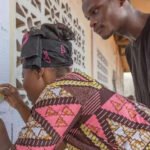A recent report has ranked Nigeria as the world’s top country with a lack of access to electricity, with 86 million of its over 200 million population living without electricity as of 2021.
Development Diaries reports that the report was jointly compiled by the International Energy Agency (IEA), the International Renewable Energy Agency (IRENA), the United Nations Statistics Division (UNSD), and the World Health Organisation (WHO).
According to the report titled Tracking SDG 7: The Energy Progress Report 2023, the countries with the largest number of people without access to electricity as of 2021 were Nigeria (86 million), the Democratic Republic of the Congo (76 million), and Ethiopia (55 million).
The report further highlighted the electricity access deficits in sub-Saharan Africa, where half of the regional population still lacks access to electricity.
It pointed out that the 20 countries with the largest access deficits accounted for 75 percent of the world’s population.
It said bridging electricity access gaps, especially for people living in poor and remote regions, required an annual rate of growth of one point per year from 2021, onward almost twice the current pace.
The report read, ‘As of 2021, the 20 countries with the largest access deficits accounted for 75 per cent of the global population without access.
‘The countries with the largest number of people without access were Nigeria (86 million), the Democratic Republic of the Congo (76 million), and Ethiopia (55 million)’.
‘If no additional efforts and measures are put in place, some 660 million people, mostly in Sub-Saharan Africa, would still be unserved in 2030’.
The African Development Bank (AfDB) had in a report noted that over 640 million Africans have no access to energy, corresponding to an electricity access rate for African countries at just over 40 percent, the lowest in the world.
The Bank’s head, Akinwumi Adesina, in March 2023, noted that in order to achieve goal seven of the United Nations Sustainable Development Goals (SDGs), Africa must connect 90 million people annually to electricity by 2030 and shift 130 million people from dirty cooking fuels each year.
As a way to bridge the gap, the report suggested that policies for energy access should demonstrate political commitment and maximise the socio-economic benefits of access, keeping the most vulnerable populations at the forefront of efforts to close the access gap.
Photo source: AfDB






